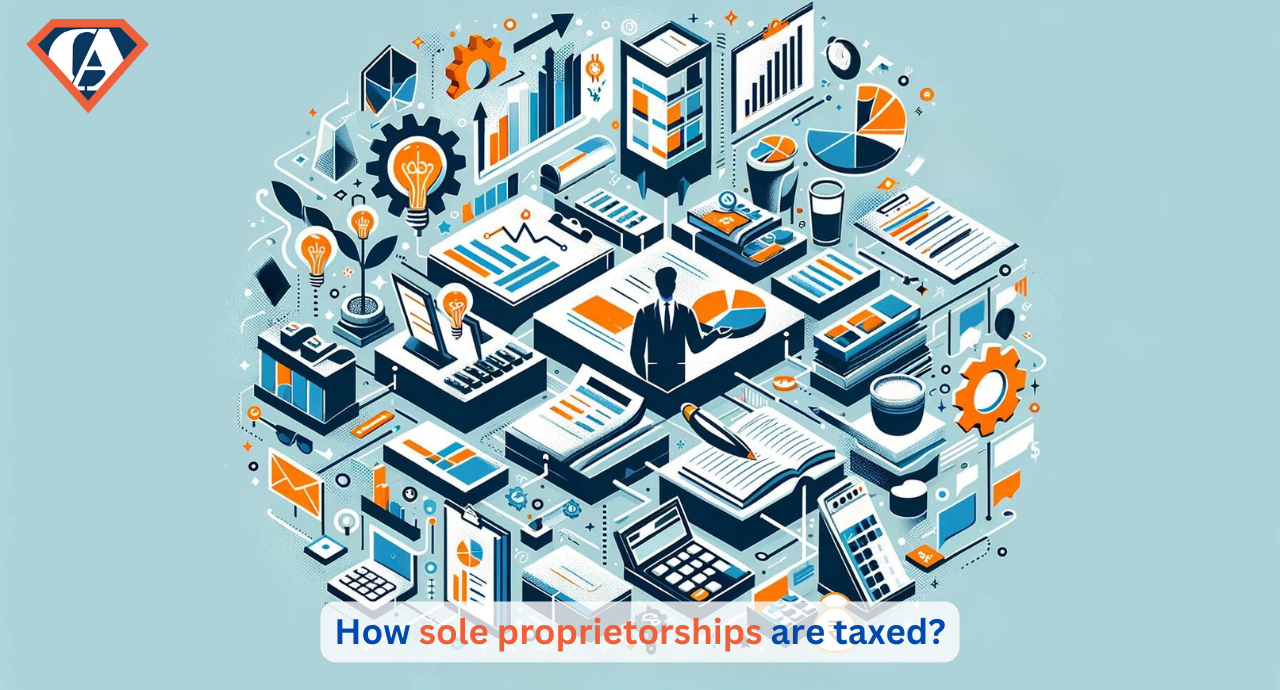How sole proprietorships are taxed?
- Posted By SuperCA
- On 23 March

1. Introduction
When it comes to starting a business, choosing the right legal structure is crucial. One common option is a sole proprietorship, where the business is owned and operated by a single individual. While sole proprietorships offer simplicity and flexibility, understanding how they are taxed is essential for any business owner. In this article, we will delve into the tax obligations and implications of sole proprietorships, providing you with a comprehensive understanding of how your business will be taxed.
2. What is a sole proprietorship?
A sole proprietorship is a type of business structure where the business is owned and operated by one individual. This means that the owner has complete control over the business and is personally liable for its debts and obligations. The owner is also entitled to all of the business's profits.
One of the advantages of a sole proprietorship is its simplicity. Unlike other business structures, there are no complex legal requirements or formalities to be met. This makes it a popular choice for small businesses and freelance entrepreneurs.
However, it is important to note that the simplicity of a sole proprietorship also extends to its tax implications. Unlike corporations or partnerships, sole proprietors are not separate legal entities from their businesses. As a result, the owner's personal income tax return is used to report business income and expenses.
In the next section, we will discuss the tax obligations and implications of a sole proprietorship in more detail. Stay tuned to gain a comprehensive understanding of how sole proprietorships are taxed.
3. Understanding how sole proprietorships are taxed
Now that we have established that sole proprietors report their business income on their personal income tax return, let's delve deeper into the tax obligations and implications of a sole proprietorship.
One key aspect to keep in mind is that sole proprietors are subject to self-employment tax. This tax is composed of both the employer and employee portions of Social Security and Medicare taxes. Unlike employees who only pay a portion of these taxes, sole proprietors are responsible for paying both portions, as they are considered self-employed individuals.
Additionally, sole proprietors are required to make estimated tax payments throughout the year. Since they do not have taxes withheld from a paycheck, it is crucial for sole proprietors to calculate and pay these estimated taxes to avoid penalties and interest.
In the upcoming sections, we will discuss these tax obligations in further detail, providing you with the information necessary to navigate the tax responsibilities of a sole proprietorship successfully.
4. Self-employment taxes for sole proprietors
As mentioned earlier, one important tax obligation for sole proprietors is the self-employment tax. This tax consists of both the employer and employee portions of Social Security and Medicare taxes, which are typically paid by employees. However, as a self-employed individual, you are responsible for paying both portions.
Calculating your self-employment tax can be a bit daunting, as it involves determining your net profit from your business and applying the relevant tax rates. To ease this process, the IRS provides a Schedule SE (Form 1040) specifically for reporting self-employment tax.
It is crucial to stay on top of your self-employment tax payments, as failure to pay can result in penalties and interest. This is why it is recommended for sole proprietors to make estimated tax payments throughout the year. In the following section, we will take a closer look at estimated tax payments and how to ensure compliance with your tax obligations as a sole proprietor. Stay tuned!
5. Deductions and credits for sole proprietors
Now that we have covered the basics of self-employment tax for sole proprietors, let's delve into another crucial aspect of taxation - deductions and credits. As a sole proprietor, you are entitled to deduct certain expenses related to your business, which can help reduce your taxable income.
Common deductible expenses for sole proprietors include business-related travel, office supplies, insurance premiums, and costs associated with maintaining a home office. However, it's important to note that these deductions must be directly related to your business and necessary for its operation.
In addition to deductions, sole proprietors may also be eligible for certain tax credits. For example, if you provide health insurance coverage to your employees, you may qualify for the Small Business Health Care Tax Credit.
Understanding and maximizing deductions and credits can significantly impact your tax liability. In the next section, we will dive deeper into the specific deductions and credits available for sole proprietors, providing you with valuable insights for optimizing your tax return.
6. Reporting income and expenses for sole proprietors
Now that we have discussed the deductions and credits available for sole proprietors, it is essential to understand how to report your income and expenses accurately. Reporting your income and expenses correctly is crucial for avoiding any issues with the IRS and ensuring you pay the correct amount of taxes.
As a sole proprietor, you will report your business income and expenses on Schedule C, which is a part of your personal income tax return (Form 1040). Schedule C allows you to detail your business's income, deductible expenses, and calculate your net profit or loss.
When reporting your income, make sure to include all the revenue generated from your business activities, including sales, services, and any other sources of income. Be diligent about keeping track of every dollar earned to avoid any discrepancies.
Similarly, when recording your business expenses, it is important to have clear documentation and receipts. Deductible expenses should be categorized under appropriate expense categories on Schedule C, such as advertising, office supplies, travel expenses, and more.
Remember, it is vital to follow the IRS rules and regulations when reporting your income and expenses. Failure to do so could result in penalties or an audit from the IRS.
In the next section, we will discuss best practices for record-keeping and organization to ensure smooth and accurate reporting of income and expenses for sole proprietors. Stay tuned for valuable tips that will make tax time less stressful for you and your business.
7. Paying estimated taxes as a sole proprietor
As a sole proprietor, it is important to stay on top of your tax obligations throughout the year. Unlike employees who have their taxes automatically deducted from their paychecks, sole proprietors are responsible for paying estimated taxes on a quarterly basis.
Estimated taxes are your way of contributing to your tax liability throughout the year. Failure to pay these estimated taxes can result in penalties and interest charges at tax time. To avoid any surprises, it is crucial to estimate your income and expenses accurately and plan accordingly.
To determine your estimated tax payments, you will need to calculate your expected income and deductions for the year. This can be challenging, especially if your business experiences fluctuations in revenue and expenses. It may be helpful to consult with a tax professional or use accounting software to ensure accuracy.
Once you have calculated your estimated tax liability, you must make quarterly payments by the designated due dates. These due dates are generally April 15th, June 15th, September 15th, and January 15th of the following year.
To make your estimated tax payments, you can use the IRS's Electronic Federal Tax Payment System (EFTPS), make a payment online, or mail a check with Form 1040-ES.
By staying diligent and consistent with your estimated tax payments, you can avoid penalties, stay on top of your tax obligations, and maintain financial stability for your business.
In the upcoming section, we will explore the importance of seeking professional advice when it comes to tax planning and compliance for sole proprietors. Stay tuned!
8. Seeking professional help for taxes as a sole proprietor
It's no secret that navigating the world of taxes can be complex and overwhelming, especially when you're a sole proprietor. As we discussed in the previous section, estimating your income and expenses accurately is crucial to staying on top of your tax obligations.
However, even with the best intentions, tax planning and compliance can be challenging for sole proprietors. That's where seeking professional help can make a significant difference.
A tax professional who specializes in working with sole proprietors can provide valuable guidance and ensure you are taking advantage of all available deductions and credits. They can also help you navigate any potential tax pitfalls specific to your industry or business structure.
By partnering with a qualified tax advisor, you can have peace of mind knowing that your tax obligations are being handled accurately and efficiently, allowing you to focus on what you do best – running your business.
In the next section, we will delve into the specific benefits of seeking professional help for tax planning and compliance as a sole proprietor. Stay tuned for expert insights and advice!
9. Conclusion: Navigating taxes as a sole proprietor
Navigating taxes as a sole proprietor can be a daunting task. As we have discussed in this blog, accurately estimating your income and expenses is crucial to staying on top of your tax obligations. However, despite your best efforts, tax planning and compliance can still be challenging. That's where seeking professional help can make all the difference.
Partnering with a tax professional who specializes in working with sole proprietors can provide you with valuable guidance. They can help you take advantage of all available deductions and credits, as well as navigate any industry-specific tax pitfalls. By entrusting your tax obligations to a qualified advisor, you can have peace of mind knowing that they are being handled accurately and efficiently.





